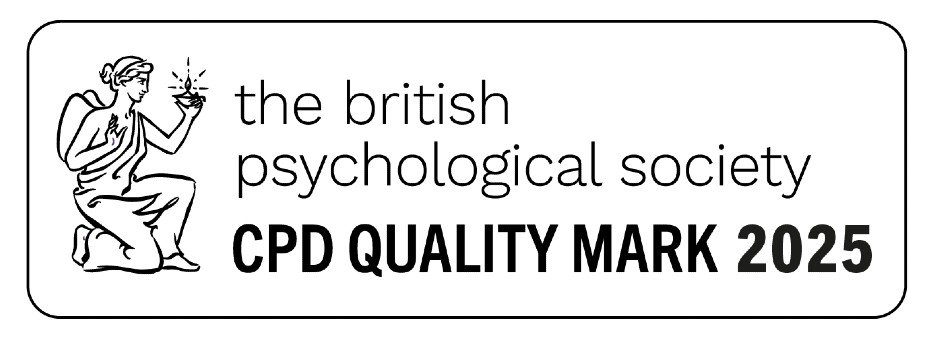
Click here to purchase Levels 1 & 2 together and save
The BPS Approved Certificate in Resource Based Therapies (RBT) consists of 3 modules / 5 training days that can be booked together or separately. The Certificate includes Motivational Interviewing & Beyond (2-day course), Solution Focused Brief Therapy (2-day course), and Positive Psychotherapy: Supercharge Your Practice (1-day course). These three approaches share considerable overlap and common theoretical underpinnings, and all utilise brief and practical interventions to facilitate change.
Click here to purchase Levels 1 & 2 together and save
The BPS Approved Certificate in Resource Based Therapies (RBT) consists of three modules delivered over five training days, which can be booked together or separately.
The three modules are Motivational Interviewing & Beyond (two days), Solution Focused Brief Therapy (two days), and Positive Psychotherapy: Supercharge Your Practice (one day).
There is a considerable overlap and shared theoretical underpinning across these three approaches. All are evidence-based, with strong empirical foundations supporting their theories, processes, and interventions.
All three approaches are resource-based in their assumptions, focusing on what clients already possess that enables them to thrive, and on how these resources can be amplified. Motivational Interviewing draws strongly on Rogers’ ideas regarding intrinsic motivation; Solution Focused Brief Therapy emphasises existing strengths; and Positive Psychology places client strengths at the centre of therapeutic change.
As a result, all three approaches are outcome, future, and thriving focused, rather than causal, deficit, and past focused — a combination that remains relatively uncommon across psychotherapeutic models. Finally, all three utilise brief and practical interventions to facilitate change.
The structure of the 5 days is as follows:
Each module starts with an introduction to the three modalities: similarities and differences between Positive Psychology, Solution Focused Brief Therapy & Motivational Interviewing and the limitations of pathology-based therapies.
Each modality is then explored in depth within its respective course.
Motivational Interviewing & Beyond
A two day training course designed to empower you to motivate your clients and patients. You’ll be taken through a range of issues, strategies and tips designed to improve your motivational strategies whatever your client group –from treatment non-compliance through offending behaviour to working with those with severe mental health problems. This evidence-based seminar will address the following issues:
Solution Focused (Brief) Therapy – SFT or SFBT
This evidence-based two-day course is designed to provide you with the highest possible standard of training, a solid grounding in Solution Focused Brief Therapy (SFBT) and enable you to make immediate use of your learning on return to your workplace. It is invaluable in a range of health care and social services environments across the age span.
Positive Psychotherapy: Supercharge Your Practice
- The history and evidence base of positive psychology and its practical application.
- Enhancing "client wellbeing" "Teaching happiness" and its use with a range of client groups from children to offenders.
- The relationship between well-being and the reduction in "problematic behaviour".
- Identifying and enhancing client strengths: VIA "Signature Strengths" and how they might be identified and used in therapy. Developing gratitude and its impact on motivation and mood.
- The development of Optimism in pessimistic clients
- Environmental interventions and their impact on pro-social behaviour and positive mood. Practical implications and uses.
The order in which delegates attend the courses is flexible. Delegates will be awarded a Certificate of Attendance upon successful completion of each course. As an additional option, delegates can take an assessment (consisting of additional reading and an online test) – successful completion of which will result in obtaining a Certificate of Assessed Academic Competence with 35 CPD hours.
Course outline
- Motivational Interviewing & Beyond - 2 Days, 14 Hours
- Solution Focused Brief Therapy - 2 Days, 14 Hours
- Positive Psychotherapy: Supercharge Your Practice - 1 Day, 7 Hours
Accreditation Level 2:
- Online Exam - 4 Hours
Accreditation Level 3:
- Final Assignment plus delegate’s supervision record - optional, has to be booked separately
Certificate Payment Options
You have two payment options - without Level 3:
Option 1:
Spread the cost - pay per course as you go along:
Total RRP £795 + VAT (£954)
Option 2:
Pay for Levels 1 & 2 together and save: £540 + VAT (£648)
Click here to purchase the whole Certificate and save
SDS Accreditation for BPS Approved Certificate in Resource Based Therapies
Accreditation Level 1 (Foundation) is the level of accreditation you obtain by attending any of the modules comprising the above Certificate via live or online training.
This level of accreditation gives you a Certificate of Attendance, as well as access to the course materials and other resources, including live SDS Tutorials, and enables you to state in your CV that you have SDS Accreditation in Resource Based Therapies Level 1 (Foundation).
Your accreditation currently lasts for 3 years, after which you cannot make the above statements and access course resources.
This level of accreditation is renewable by sitting an online course on the topic again (50% discount applies) or attending a next live/online module of the Certificate.
SDS Accreditation, Level 2 (Assessed Academic Competence) is the level of accreditation you obtain by attending all modules of an SDS Modular course via live training or live/recorded webcast and passing an appropriate online exam after completing the whole course.
This level of accreditation gives you a BPS Approved Certificate in the appropriate subject, as well as access to the course materials and other resources, including live SDS Tutorials. It also enables you to state in your CV that you have Level 2 (Assessed Academic Competence) Accreditation as a Practitioner in Resource Based Therapies.
Your accreditation currently lasts for 3 years, after which you cannot make the above statements and access course resources.
This level of accreditation is renewable by sitting an online course on the topic again (50% discount applies).
SDS Accreditation, Level 3 (Clinical Proficiency) is as Level 2, with the addition of:
- Submitting a project of an acceptable standard (3,000 words) at the end of your Certificate training. The purpose of the project is to illustrate that you can apply the academic knowledge gained from the course to a clinical situation.
- Submitting a written statement from your Clinical Supervisor confirming the regularity and duration of your supervision with them and your Competence as a clinician in the chosen topic. Your Clinical Supervisor should meet our qualification criteria in either Motivational Interviewing and/or Solution Focused Therapy.
This level of accreditation gives you a BPS Approved Certificate in the appropriate subject, as well as access to the course materials and other resources. It also enables you to state in your CV that you have Level 3 (Clinical Proficiency) Accreditation as a Practitioner in Resource Based Therapies.
You also will be given an option to be listed in the SDS Register of Qualified Practitioners in the appropriate field – our Network of Qualified Practitioners.
Your accreditation currently lasts for 3 years, after which you cannot make the above statements and access course resources.
This level of accreditation is renewable by sitting an online refresher course or attending a live course/webcast listed as a suitable refresher course and by submitting a new written statement from your Supervisor. Should you renew your accreditation within these 3 years, your access to these refresher courses and the written assignment is discounted by 50%.* Should you let your accreditation lapse, you pay the full price for the refresher training.
If you are interested in Clinical Supervision in Resource Based Therapies with Paul Grantham, contact the office on info@sds-seminars.com


